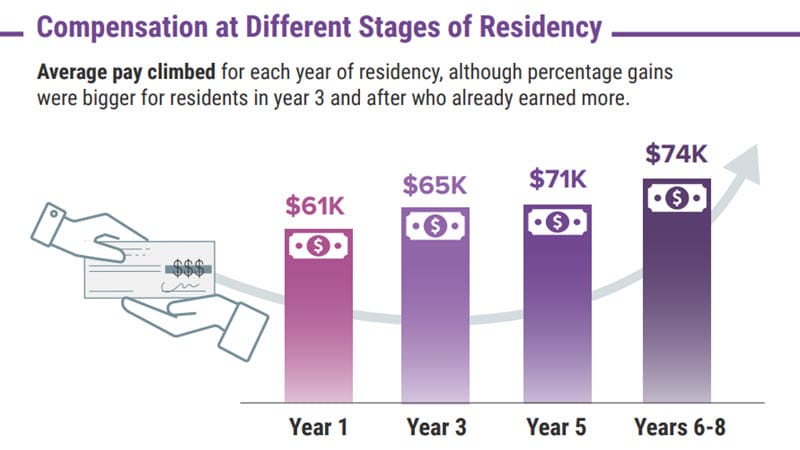Residents' Compensation Trends and Debt Report
Core Concepts
Residents' compensation has increased, but many still feel underpaid.
Abstract
The content discusses the recent compensation trends for medical residents, highlighting a significant increase in their pay. Despite this, a majority of residents believe they should be earning more. The infographic showcases the yearly trend in resident compensation, residents' desired pay increase, and the amount of debt they accumulate during medical school. For more detailed information, the Medscape Resident Salary & Debt Report 2023 is recommended.
- Medical residents received the largest compensation increase in at least 7 years.
- 3 out of 4 residents believe they should earn 26% more annually.
- The infographic illustrates resident compensation trends and desired pay levels.
- It also addresses the financial burden of borrowing for medical education.
- The Medscape Resident Salary & Debt Report 2023 provides further insights.
Customize Summary
Rewrite with AI
Generate Citations
Translate Source
To Another Language
Generate MindMap
from source content
Visit Source
www.medscape.com
Infographic: Residents' Bank Accounts Fatten After Lean Years
Stats
Medical residents, on average, got a compensation bump that was the biggest in at least 7 years.
Still, about 3 in 4 residents think that they should earn at least 26% more per year than they do today.
Quotes
"No matter how much residents are paid, many still feel undercompensated for their work."
Key Insights Distilled From
by Jon Mckenna at www.medscape.com 09-21-2023
https://www.medscape.com/viewarticle/996480
Deeper Inquiries
How can medical institutions address the discrepancy between residents' pay expectations and actual compensation?
Medical institutions can address the discrepancy between residents' pay expectations and actual compensation by implementing transparent communication channels. They should openly discuss the factors that influence resident compensation, such as funding sources, program budgets, and industry standards. Additionally, institutions can provide financial literacy training to residents to help them understand the financial aspects of their compensation package. Offering performance-based incentives and career advancement opportunities can also help align residents' pay expectations with reality. Regular feedback sessions and surveys can be conducted to gauge residents' satisfaction with their compensation and make necessary adjustments.
What are the potential long-term effects of residents feeling undervalued in terms of patient care?
Residents feeling undervalued in terms of patient care can have significant long-term effects on healthcare outcomes. When residents feel undervalued, they may experience burnout, leading to decreased job satisfaction, lower quality of patient care, and higher rates of medical errors. This can ultimately impact patient safety and satisfaction levels. Additionally, a lack of recognition and support for residents can contribute to a negative work environment, leading to higher turnover rates and difficulties in recruiting top talent. Addressing residents' feelings of undervaluation is crucial for maintaining a high standard of patient care and ensuring the well-being of healthcare professionals.
How can social media platforms like Facebook and Instagram impact the perception of resident compensation and debt?
Social media platforms like Facebook and Instagram can impact the perception of resident compensation and debt by amplifying residents' voices and experiences. Residents can use these platforms to share their stories, struggles, and achievements, shedding light on the challenges they face regarding compensation and debt. This can raise awareness among the general public, policymakers, and healthcare institutions about the financial hardships residents endure. Additionally, social media can be a powerful tool for advocacy and mobilization, enabling residents to organize and demand fair compensation and debt relief. However, social media can also perpetuate unrealistic expectations or misinformation about resident compensation, leading to misconceptions and misunderstandings. It is essential for residents, medical institutions, and policymakers to engage thoughtfully on social media to ensure an accurate and balanced portrayal of the issues surrounding resident compensation and debt.
0
